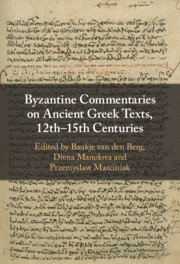Book contents
- Byzantine Commentaries on Ancient Greek Texts, 12th–15th Centuries
- Byzantine Commentaries on Ancient Greek Texts, 12th–15th Centuries
- Copyright page
- Contents
- Contributors
- Introduction Byzantine Commentaries on Ancient Greek Texts
- Chapter 1 The Politics and Practices of Commentary in Komnenian Byzantium
- Chapter 2 Forging Identities between Heaven and Earth
- Chapter 3 Cultural Appropriation and the Performance of Exegesis in John Tzetzes’ Scholia on Aristophanes
- Chapter 4 Uncovering the Literary Sources of John Tzetzes’ Theogony
- Chapter 5 Odysseus the Schedographer
- Chapter 6 Eustathios of Thessalonike on Comedy and Ridicule in Homeric Poetry
- Chapter 7 Geography at School
- Chapter 8 Painting and Polyphony
- Chapter 9 Parodying Antiquity for Pleasure and Learning
- Chapter 10 Teaching Poetry in the Early Palaiologan School
- Chapter 11 Late Byzantine Scholia on the Greek Classics
- Chapter 12 Theodora Raoulaina’s Autograph Codex Vat. gr. 1899 and Aelius Aristides
- Chapter 13 The Reception of Eustathios of Thessalonike’s Parekbolai in Arsenios Apostolis’ and Erasmus’ Paroemiographic Collections
- Index
- References
Chapter 6 - Eustathios of Thessalonike on Comedy and Ridicule in Homeric Poetry
Published online by Cambridge University Press: 07 August 2023
- Byzantine Commentaries on Ancient Greek Texts, 12th–15th Centuries
- Byzantine Commentaries on Ancient Greek Texts, 12th–15th Centuries
- Copyright page
- Contents
- Contributors
- Introduction Byzantine Commentaries on Ancient Greek Texts
- Chapter 1 The Politics and Practices of Commentary in Komnenian Byzantium
- Chapter 2 Forging Identities between Heaven and Earth
- Chapter 3 Cultural Appropriation and the Performance of Exegesis in John Tzetzes’ Scholia on Aristophanes
- Chapter 4 Uncovering the Literary Sources of John Tzetzes’ Theogony
- Chapter 5 Odysseus the Schedographer
- Chapter 6 Eustathios of Thessalonike on Comedy and Ridicule in Homeric Poetry
- Chapter 7 Geography at School
- Chapter 8 Painting and Polyphony
- Chapter 9 Parodying Antiquity for Pleasure and Learning
- Chapter 10 Teaching Poetry in the Early Palaiologan School
- Chapter 11 Late Byzantine Scholia on the Greek Classics
- Chapter 12 Theodora Raoulaina’s Autograph Codex Vat. gr. 1899 and Aelius Aristides
- Chapter 13 The Reception of Eustathios of Thessalonike’s Parekbolai in Arsenios Apostolis’ and Erasmus’ Paroemiographic Collections
- Index
- References
Summary
This chapter opens a perspective onto the more theoretical or conceptual side of humorous discourse in twelfth-century Byzantium by exploring the reflections on ridicule and comedy in Homeric poetry in the commentaries by Eustathios of Thessalonike. Eustathios addresses the social aspects of ridicule, as well as its rhetorical dynamics and its role in narrative. In his view, Homer uses comic elements to counterbalance the gloominess of the Iliad’s war narrative, as a good rhetor should do. Flyting has the same function: even if the addressees in the narrative are stung by such insults, Homer’s primary narratees are expected to be amused by the often humorous verbal abuse. Eustathios repeatedly points to the moral tensions inherent in ridicule and laughter; as the consummate orator, however, Homer always finds a way to keep his dignity intact. Throughout his commentaries, Eustathios offers his target audience of prose writers numerous examples of how to adopt and adapt Homer’s words in order to ridicule certain bodily defects, excessive behaviours or less-than-perfect intellectual skills. Such comments shed light on what was worthy of mockery in the mind of a Byzantine audience and show that it was expected of urbane rhetors to use ridicule in their writings.
Keywords
- Type
- Chapter
- Information
- Publisher: Cambridge University PressPrint publication year: 2022

